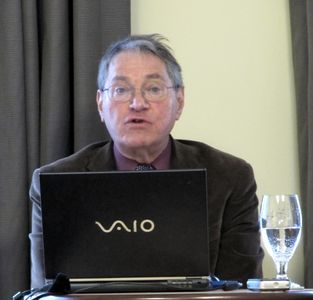Experts Discuss Energy, Security, and Conflict at the 7th Sawyer Seminar
On Friday, March 25, 2011, the John Sawyer Seminars on Energy Transitions and Society convened for its seventh meeting. The session entitled Energy, Security, and Conflict featured Amy Myers Jaffe and Michael Klare, and was moderated by Dana Bauer, Professor of Geography at Boston University.

Amy Myers Jaffe is the Wallace S. Wilson Fellow in Energy Studies and director of the Energy Forum at the Baker Institute, as well as associate director of the Rice Energy Program. Her presentation, entitled “Middle East Turmoil and Implications for Global Oil Markets,” emphasized the nature of the energy problem. “It is geopolitics rather than geology,” Jaffe said. She challenged in particular predictions that the vast majority of future oil supply increases will come from the Middle East and North Africa hinting that those increases might fail to materialize as expected given the ongoing and possible future regional turmoil –whether sectarian unrest, regime changes, or questions of political succession. Barring a major economic downturn, Jaffe concluded, current outlook points to sustained high oil prices and a shift in investment focus to unconventional fossil fuels, such as shale oil.

Michael Klare is the Five College Professor of Peace and World Security Studies, based at Hampshire College in Amherst, Massachusetts. His presentation highlighted how recent the development in the Middle East and Japan destabilized predictions that the Middle East would provide an ever-increasing share of the world’s petroleum supply and that new nuclear reactors would boost the world’s supply of nuclear energy. With respect to recent developments in Middle East, he asked how the United States’ regional role will evolve given America’s long-term commitment to “security” in the oil-producing areas and its close collaborations with key regimes in the region, notably those in Egypt and Saudi Arabia. On another hand, he observed that the damage of the Fukushima Daiichi nuclear power plant will influence the support for nuclear energy in future policies, and hence indirectly shape an increase in the world demand for fossil fuels.
Following the presentations the audience engaged in an animated discussion, if not apocalyptic at moments. Dana Bauer invited the speakers to reflect on the role of renewables in their visions of the future of energy. Participants discussed the scale of renewables, China’s recent investments and commitments to a “green” industrial revolution as well as the need to distinguish between renewables and efficiency in thinking the future of energy. Some of the other issues discussed included how to shift the geopolitical discourse away from a hostile “your-resource-versus-my-need,” which only feeds national anxieties and fulfills its own conflict prophecies.
The seminar series, supported by a grant from the Andrew W. Mellon Foundation has met once each month during the Fall 2010 and Spring 2011 semesters to discuss various aspects of how energy transitions are themselves socially constituted and how they have, and are likely to, impact society. The last Sawyer Seminar, on The Geographies of Energy, will be held on Friday, April 22 at the Pardee Center.